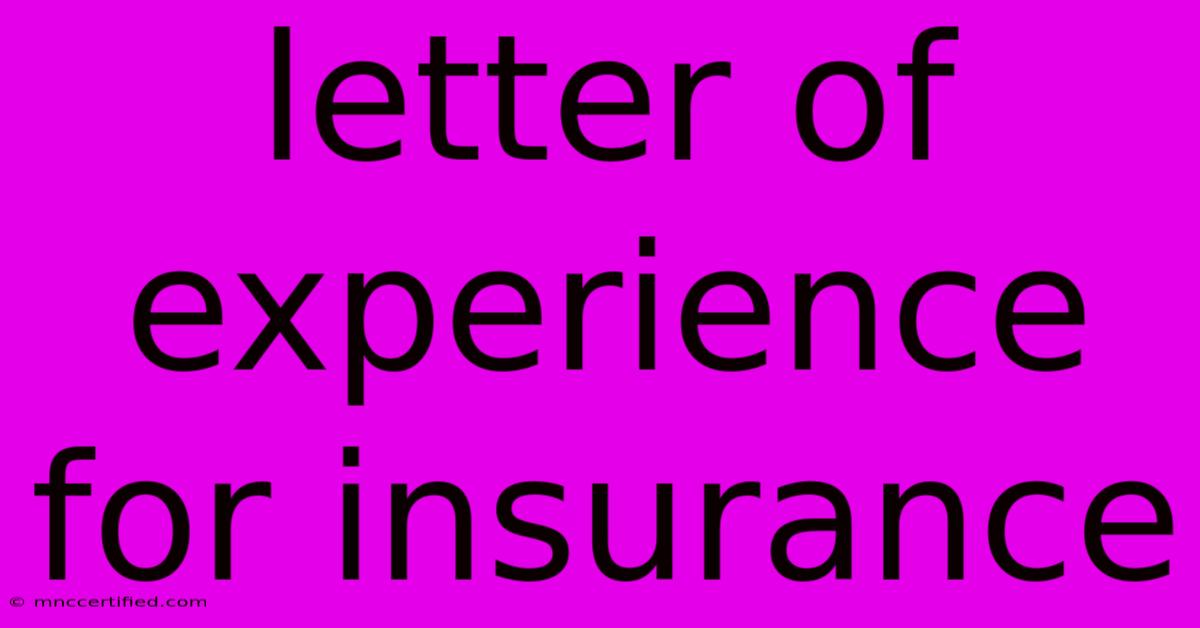Letter Of Experience For Insurance

Table of Contents
Crafting a Compelling Letter of Experience for Insurance Roles
Landing your dream job in the insurance industry requires more than just a strong resume. A well-crafted letter of experience showcasing your skills and achievements is crucial. This guide will walk you through writing a letter of experience for insurance that grabs the recruiter's attention and sets you apart from the competition. We'll cover everything from structuring your letter to highlighting relevant keywords, ensuring your application ranks higher in search engine results.
Understanding the Purpose of a Letter of Experience
Unlike a cover letter, which accompanies a resume for a specific job opening, a letter of experience serves as a broader showcase of your expertise within the insurance sector. It's a powerful tool to highlight your accomplishments and demonstrate your suitability for a range of roles. Think of it as a more detailed and focused version of your resume's summary section, tailored to the specific area of insurance you're targeting (e.g., property and casualty insurance, life insurance, health insurance, commercial insurance).
Structuring Your Letter of Experience for Maximum Impact
A winning letter of experience adheres to a clear structure:
1. Introduction: Begin by introducing yourself and clearly stating your area of expertise within the insurance industry. Mention the specific types of insurance you've worked with (e.g., auto insurance claims, underwriting, risk management, brokerage). This immediately sets the context and targets relevant keywords.
2. Highlight Key Achievements and Quantifiable Results: This is the most crucial part. Don't just list your responsibilities; quantify your successes. Use the STAR method (Situation, Task, Action, Result) to describe specific scenarios where you excelled. For example:
- Situation: "Faced a high volume of complex claims during peak season."
- Task: "Needed to efficiently process claims while maintaining accuracy and regulatory compliance."
- Action: "Implemented a new claims processing workflow, utilizing [specific software/technique]."
- Result: "Reduced processing time by 15% and improved claim accuracy by 10%."
Use strong action verbs (e.g., managed, analyzed, negotiated, developed, implemented) to demonstrate your capabilities. Remember to use relevant keywords related to insurance industry practices and software (e.g., Actuarial Science, policy administration, claims management systems, risk assessment models).
3. Showcase Your Skills and Expertise: Detail the specific skills you possess that are highly valued in the insurance industry. These might include:
- Analytical skills: Ability to interpret data, identify trends, and make informed decisions.
- Communication skills: Effective verbal and written communication with clients, colleagues, and stakeholders.
- Problem-solving skills: Ability to identify and resolve complex issues efficiently and effectively.
- Negotiation skills: Ability to negotiate favorable outcomes in claims settlements or policy negotiations.
- Regulatory knowledge: Understanding of relevant insurance regulations and compliance requirements.
4. Demonstrate Your Professionalism and Ethics: The insurance industry places a high value on integrity and ethical conduct. Showcase instances where you demonstrated these qualities.
5. Conclusion: Reiterate your interest in insurance roles and express your enthusiasm to learn more. Include your contact information and encourage the reader to reach out.
Optimizing Your Letter for Search Engines (SEO)
While primarily for human readers, strategically including relevant keywords improves your online visibility. Use keywords naturally throughout the letter; don't stuff them in. Focus on long-tail keywords (e.g., "experience in commercial auto insurance claims," "expert in health insurance underwriting").
Off-Page SEO Strategies: Building Your Online Presence
Your letter of experience is only one piece of the puzzle. Building a strong online presence complements your application. Consider:
- LinkedIn Profile: Create a comprehensive and keyword-rich LinkedIn profile highlighting your insurance experience.
- Networking: Attend industry events and connect with professionals on LinkedIn.
- Professional Development: Obtain relevant certifications to enhance your credibility.
By following these steps, you'll craft a compelling letter of experience that not only showcases your qualifications but also enhances your online visibility, ultimately increasing your chances of landing your dream insurance job. Remember to tailor your letter to each application, highlighting the most relevant skills and experiences for the specific role.

Thank you for visiting our website wich cover about Letter Of Experience For Insurance. We hope the information provided has been useful to you. Feel free to contact us if you have any questions or need further assistance. See you next time and dont miss to bookmark.
Featured Posts
-
Erivo Grande Wicked Tears On Set
Nov 23, 2024
-
Xiao Long Knocks Out Quang Le
Nov 23, 2024
-
Floating Neutral Vs Bonded Neutral
Nov 23, 2024
-
Anna Samson On Paradise Audience Response
Nov 23, 2024
-
James Injury Chelseas Uncertain Future
Nov 23, 2024